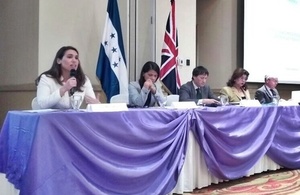Honduras successfully implements Law against Human Trafficking according to an international study
Supported by the UK and working with Global Partners Governance (GPG), the Honduran Congress and CICESCT have been involved in the first post-legislative scrutiny exercise.

Presenting Law againts human trafficking
Supported by the UK and working with Global Partners Governance (GPG), an international organisation that works to strengthen political institutions, the Honduran Congress and the Interagency Commission Against Commercial Sexual Exploitation and Human Trafficking of Honduras (CICESCT in Spanish), have been involved in the first post-legislative scrutiny exercise in the Central American region.
The legislation being reviewed was the Law against Human Trafficking and the scrutiny exercise determined that there had been a decrease in the incidence of human trafficking whilst recommended further strengthening of the technical institutions involved.
The post-legislative scrutiny report of the Decree number 59-2012, the Law Against Human Trafficking, was officially handed over today. The document compiles and analyses the inputs from government institutions, the justice system, civil society organisations, and private sector representatives involved in the implementation of this standard. The report contains important recommendations aimed at the different sectors in order to fully deliver the objectives of the law.
Post-legislative scrutiny has been adopted by various legislative bodies worldwide, including the British Parliament. It makes clear that the work of the legislator does not conclude when a bill has been passed, but extends to ensuring its application and implementation. In Central America, the National Congress of Honduras will be the first to have endorsed such a pilot project, with the desire to repeat the exercise in other laws of public interest.
The project funded by the British Government, included workshops, electronic consultations and interviews with relevant actors in Honduran society. Congressmen and technical staff of the legislative body were also trained in the ex-post evaluation of approved laws.
To mark the event, the Charge d’Affaires and Deputy Head of mission for the British Embassy, Andrew Tate said:
The passing of legislation is important, but the implementation of that legislation is what really makes a difference. Establishing a system where all relevant partners and stakeholders are consulted on how effectively a law has been implemented ensures that democracy – through parliament and government – delivers change for the benefit of the people. We are delighted to have been able to support this work in Honduras, particularly as it relates to joint efforts to combat the global evil of human trafficking and commercial sexual exploitation, which, our Prime Minister has made clear, is a priority for her Government.